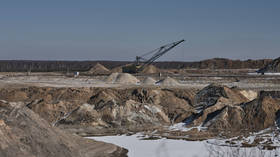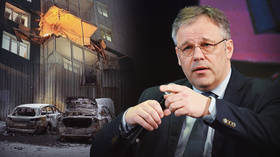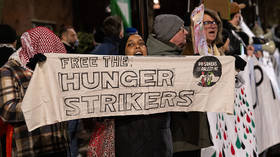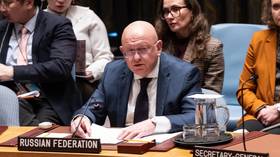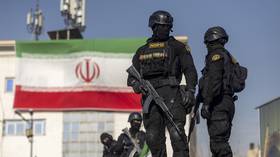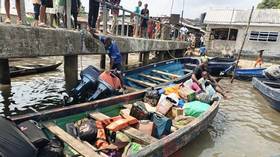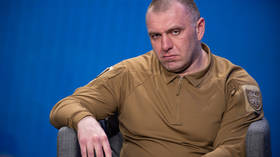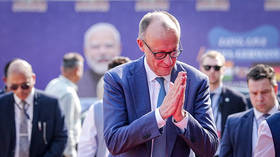My Maidan memories: Living through Ukraine's nightmare year (Part 1)
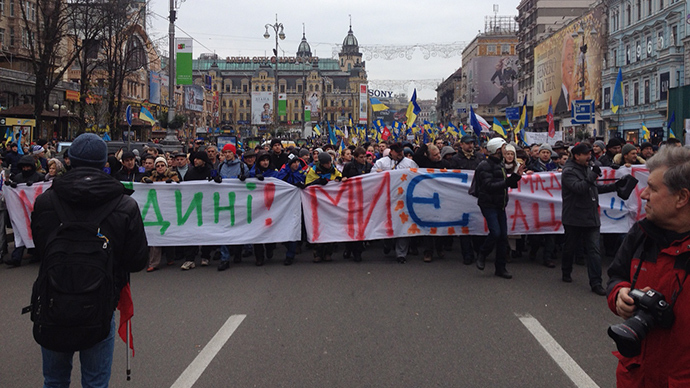
It's only been a year, but it feels like an eternity. Yet those events in Kiev – that warm November Maidan, when we had no idea how much blood and suffering would follow – are engraved on my memory.
On that evening, a few of my colleagues remarked on a tweet by the renowned Ukrainian journalist, Mustafa Nayyem (who now sits in parliament). “Lets meet up at 22:30 under the Independence monument. Dress warm, bring umbrellas, tea, coffee, good mood and friends," he wrote. It looked like a genuine invitation to a picnic. One of my Ukrainian colleagues, who had spent a day with all of us in front of the Ukrainian parliament, frowned with disapproval – “Oh, c'mon! Another protest, seriously? As if people still haven’t realized this country cannot be changed by flag-waving.”

Oh boy, how wrong he was – and all of us, for that matter. We naively thought that this gathering, one of many, wouldn't change a damn thing.
Before I go on with the story, I'd like to emphasise to readers that this article is not an attempt to “brainwash” or offend anyone. After all, there are so many opinions out there as to what happened in Ukraine then, and what is happening there now. I merely want to tell the story as I saw it in Kiev a year ago – and my opinion does not necessarily reflect the opinion of my employer, the RT news channel. This story is solely focused on that first Maidan, and I will write separately about the protest’s later stages.

You may ask – why was there such initial pessimism about the first Maidan? Because in the four years I had spent living and working in Kiev, I had seen a lot of such gatherings. Always loud, always tense, but never fruitful. Some may say, "What about the Orange Revolution?" Yes, undoubtedly it brought some result – although I’m not sure it was the result Ukraine was craving for.
And that is exactly why in February 2010 Viktor Yanukovich – the man completely written-off after his fiasco in 2004 – came to power. Legitimately elected by a majority of votes. That is exactly why three-and-a-half years later many desperately grasped on to the idea, which his predecessor Viktor Yushenko was fondly cherishing, but never fulfilled – to sign an association agreement with the EU. That is why angry people took to the streets again.

I remember feeling utterly surprised when the first talk of Yanukovich pushing through the EU association deal came up – although at the time I felt that government could not surprise me anymore. Roughly a year into his presidency, it was already clear by then that Yanukovich was not a messiah, that he would not pull ties between Ukraine and Russia out of the mud, which Yushchenko had dragged them into. Yes, investment from Russia had increased. Yes, some factories – like the Antonov airplane factory - had a second lease of life. Yes, Yanukovich abolished the controversial and much-maligned glorification of the 1940s Ukraine Insurgent Army – a move that irritated both Moscow and many in Ukraine itself.
But it was evident that on an inter-state level things were messy as well. The total stalemate in talks to alter the gas price for Ukraine was ample proof of that. Some even speculated whether Putin actually disliked Yanukovich on a personal level. Some were more pragmatic – that Yanukovich and his team were too ardent in pursuing their national, or personal, interests in talks with Moscow. But from whatever side one looked at it, Yanukovich’s push toward the EU made little sense – considered as either a bargaining chip to use in negotiations with Moscow or as an attempt to rescue his fast-falling approval ratings. This decision looked particularly bizarre, considering Moscow made itself quite clear about the possible outcomes. You probably have your own opinion on whether such a reaction was justified. But I doubt many will question the fact that any country has the right to protect its economic interests. Back then few thought – let alone reported on it – that in the case of the Ukraine market’s total re-orientation, Russia would have suffered a massive hit to its industry. The damages could have been in the billions of euros.

Ukraine reached Maidan-2013 in a lamentable state. Corruption – always strong since the fall of the USSR – was at astronomical levels. I knew a few people who lost their businesses after visits by thugs in leather jackets. Even the brilliantly-staged Euro2012 football tournament did not sweeten the bitter pill – the land which had had an uneasy economic and ethnic situation even before Yanukovich, was on the edge. We sometimes spoke with colleagues of mine – by colleagues I mean those working at Russian, Ukrainian and Western media – about when it was going to go off. Not if, but when. When the riots in Vradievka happened, it felt just like the beginning of it. It calmed down, but not for too long.
My work as the bureau's chief reporter in Kiev ended in November 2012, right after the parliamentary elections. I remember putting the case to management – I felt that the election results almost guaranteed things would not become calmer. That in six months we may see a genuine storm, a lot more serious than the ever-present power in-fighting in Ukraine (I mean endless dismissals of parliament, early votes, fistfights inside the Rada, blackmail). But, on the other hand, going back to Moscow meant that Kiev was only an hour's flight away – although I did not expect that I would be flying back and forth almost every two months. And not even because I love Ukraine – I still think that the time I spent there was the happiest in my life – and not because I’ve left so many friends and close people there. Slowly but steadily, the revolution was boiling up there. It leaked through minor civic upheavals and worsening of the economy. I was wrong in my estimations only by six months.

On November 16, 2013, I went to the producers and expressed my concerns that this time it may be close to actually flaring up. That I had inside info – don’t ask where from, I’ve had plenty of good sources in Ukraine then – that the EU deal would not be signed. “Well, go there for 3-5 days, if nothing happens you can always do a couple of feature stories," was the response. It's worth mentioning that by then the previously propaganda-free (I hate the P-word, but there’s no other way of putting it) society in Ukraine was already bombarded with information on how the EU deal would change their lives – more incomes, better standards of living, European values. The full spectrum of clichés. Globally, we were among the very few – if not the only one – media to report the other side of the story (and you can easily find my reports from that time online). That the association deal may only bring positive effects to ordinary Ukrainians in the long term – after at least 20 years. That the immediate blow to the country’s economy could be devastating, particularly in machinery which almost entirely depended on trade with Russia. That the EU association deal would not mean the country becomes a member of the EU any time soon (Turkey was and is a good example of that). We reported on that not because we wanted to discredit the EU, and not because we had a mission against Ukrainians. But because those worries and concerns were expressed to us by renowned economists in Ukraine – even those who thoroughly supported integration with Europe. They also told us that Ukraine can and should have the best of both worlds – which it has been doing since the USSR ceased to exist. Nevertheless, people there didn’t want to listen to us or them, as if they were blinded or obsessed with this EU deal. Those, however, were the bunch who preferred to voice their stances from the comfort of their armchairs. People who were ready to act had a slightly different opinion.
When I first came to that Nayyem-inspired Maidan, I saw these people. The people who knew very well – that the EU doesn’t want them for now. But they also knew very well that they were fed up with living in a country like this.
They were of different intellectual and income levels – students, journalists, poets, carpenters, managers, photographers, donut sellers. All united by the wish to make their country better. I shall repeat myself – and I reported on this back then – there was a clear understanding on that Maidan that the long-sought-after EU agreement would be just a formality. That it will still have to be ratified by all EU members – which seemed doubtful in the times of the Eurozone crisis. That this agreement will first and foremost change the legislative basis in Ukraine, bringing it under European standards. Not all actually understood what those standards meant, but the existing laws – and, most importantly, not keeping them – made people furious. How can one criticize the people’s will to aspire to a better life? Especially when they are not breaking any laws – not blocking traffic, not ripping cobblestones from under their feet and are not arming themselves?

I will say this – everything happening at THAT Maidan back then was sweet and innocent. Which did not apply to another ridiculous display at the nearby European Square – literally 200 steps away. Another numerous rallies, filled with fiery speeches by the same old politicians. Everything looked like one big Groundhog Day – except that people at those rallies may have got slightly more irritated than before. Those protesting (although I'm still not sure if its right to call them protesters) at the Maidan even spoke of figurative borders between them and those at the European – we’re here with no party flags, let them stay somewhere else. It was quite telling, that the only clashes with the police at that time happened at the European square – where political parties rallied. There was nothing like that at the Maidan – there were dialogues, there were guitar songs, there was faith in making things better. And then – all of a sudden – somebody decided to put paid to that with batons and raw strength.
When my cameraman called me at 5am with “Where are you? Maidan was dispersed!” I could not believe what I had heard. Who? What for? Why was the force used? Now, a year on, we can say – many investigations of tragic events over that period have drowned in the whirlpool of the events.
Of course, I'm not the only one who wants to know – who fired sniper rifles at February’s Maidan, what exactly happened in Odessa and what and who brought down MH17. We may never know.
But I still hope at least one thing becomes clear some day – who ordered the use of force against a handful of students, who would have probably gone home in a few days anyway? It was that episode which changed everything. In two days, a furious crowd of many thousands marched through the streets of Kiev. The crowd which put the EU association deal far aside. Police surrendered without a fight. Maidan was immediately occupied, as well as the City Administration building. A few hours later, first major clashes erupted by the presidential administration building. For the first time in Kiev, me and my crew breathed and choked on pepper gas. Something I never imagined could happen in wonderful Kiev. It was then that the mechanism of revolution – bloodletting, cruel to both its heroes and its antagonists – was activated. It was then that the absolutely justified and long-boiled rage of the people began to be transformed. First, into a persistent several-month-long siege, and then to somebody’s personal weapon to bring down the state.
To be continued...
Aleksey Yaroshevsky, RT
The statements, views and opinions expressed in this column are solely those of the author and do not necessarily represent those of RT.
The statements, views and opinions expressed in this column are solely those of the author and do not necessarily represent those of RT.


